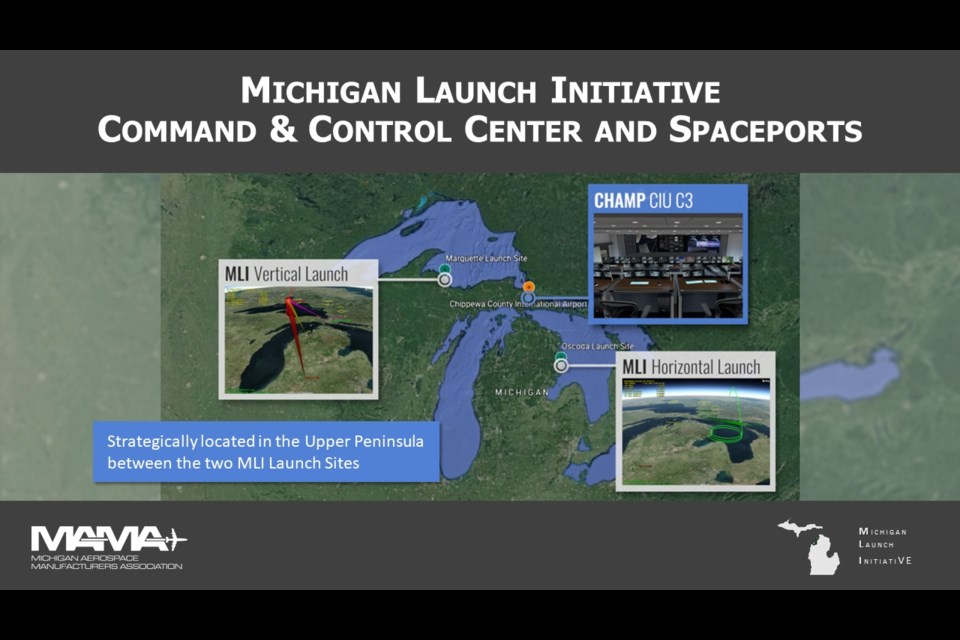Chippewa County International Airport, located just south of the Michigan Sault, has been chosen as the command and control centre for a satellite-launching enterprise that officials hope will create 40,000 jobs in the state.
Michigan Aerospace Manufacturers Association (MAMA) announced yesterday that the former Kincheloe Air Force Base was selected from four short-listed Michigan locations.
Factors considered included community support, constructability, existing communication infrastructure, established workforce and aerospace industry, the association said.
“We are extremely pleased with and excited about the selection of Chippewa County for the command and control centre location,” Chris Olson, president of Chippewa County Economic Development Corp., said in a written statement.
“Chippewa’s proposal provides an ideal balance of industry expertise, local know-how and national security space proficiency necessary for the successful implementation of a premier command and control centre," Olson added.
As SooToday's James Hopkin reported this past summer, MAMA wants to build a vertical launch site in Marquette County and a horizontal site at Oscoda-Wurtsmith Airport south of Alpena.
Traditional vertical launch vehicles use rocket power to take off from a fixed launch pad.
Horizontal reusable launch vehicles take off and land on conventional airport runways, using jet power or a controlled glide.
"The command and control centre will support both launch sites and provide classified and unclassified capabilities for the Department of Defense and commercial space organizations," MAMA said in a news release.
"It will manage satellite operations once rockets carrying small- and mid-sized satellites are launched from the horizontal and vertical launch sites into low Earth orbit, which about 1,200 miles above the Earth. It also will manage research and development for high-speed suborbital flights."
Gavin Brown, MAMA's executive director, added: “This large and contiguous site in Chippewa has existing facilities that can easily be converted to support the command and control centres' mission."
“It also has early radar line-of-sight tracking for the horizontal and vertical launch sites to support our Michigan launch initiative. The Chippewa community’s strong partnerships within the aerospace industry and its established aerospace labour market will allow for immediate support for the centre."
“Upon future determination, a military aspect will be key in the Michigan launch initiative, enabling us to interface with the Department of Defense on projects that utilize satellites and other space assets. Michigan’s new launch sites and our evolving space ecosystem will help position our state to be a true leader. We are thrilled to welcome Chippewa to the team.”
MAMA will now work with state and Chippewa County officials on issues including environmental permitting, site design and construction.
The initiative is being launched as a public/private nonprofit entity, to allow academics, industry, and governments to provide low-earth orbit and hypersonic launch technology for commercial and defense applications.
The association wants to eventually conduct 12 launches a year from each of the Marquette and Oscoda facilities.
"The actual launch rate will likely begin much lower and slowly increase over several years," it says in a briefing document.
"Aerospace companies bring with them high-paying jobs," the group says.
"The median salary for a research and development senior systems engineer is approximately US$103,900 per year. A senior mechanical system engineer makes approximately US$97,800 per year. Other construction, manufacturing, and trade jobs are also anticipated to be created."
The association sees tourist potential for its Upper Peninsula launches, with hotels and dining establishments reaping benefits.
The Chippewa County facility is the initiative's final proposed site.
Operations are expected to start at the Oscoda horizontal launch site in late 2023 or early 2024, and at the Marquette vertical launch site by early 2025.Northern Michigan is considered well-positioned for polar orbit launches, as well as offering infrastructure for logistics and technical support.
“These are exciting times in the space industry,” MAMA's Gavin Brown said. “The space domain is critical to both our national security and economic viability. Space is a significant growth area for both the Department of Defense and commercial sectors for the foreseeable future. We are honoured to be leading this effort.”
